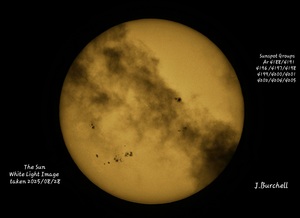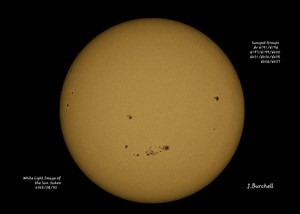[et_pb_section fb_built="1" theme_builder_area="post_content" _builder_version="4.27.5" _module_preset="default"][et_pb_row _builder_version="4.27.5" _module_preset="default" theme_builder_area="post_content"][et_pb_column _builder_version="4.27.5" _module_preset="default" type="4_4" theme_builder_area="post_content"][et_pb_text _builder_version="4.27.5" _module_preset="default" theme_builder_area="post_content" hover_enabled="0" sticky_enabled="0"]
The 3rd of Jan 2026 saw the 1st Full Moon of the year and several members got out their scopes and cameras and took some lovely images of the Moon. Some members also took the opportunity to image the Sun that day too.
[/et_pb_text][/et_pb_column][/et_pb_row][et_pb_row _builder_version="4.27.5" _module_preset="default" column_structure="3_5,2_5" theme_builder_area="post_content"][et_pb_column _builder_version="4.27.5" _module_preset="default" type="3_5" theme_builder_area="post_content"][et_pb_image src="https://crayfordmanorastro.com/wp-content/uploads/2026/01/WhatsApp-Image-2026-01-03-at-21.09.45.jpeg" _builder_version="4.27.5" _module_preset="default" theme_builder_area="post_content" title_text="WhatsApp Image 2026-01-03 at 21.09.45" hover_enabled="0" sticky_enabled="0"][/et_pb_image][/et_pb_column][et_pb_column _builder_version="4.27.5" _module_preset="default" type="2_5" theme_builder_area="post_content"][et_pb_text _builder_version="4.27.5" _module_preset="default" theme_builder_area="post_content" hover_enabled="0" sticky_enabled="0"]
Sun & Full Moon by Honor Wheeler.
Taken using a Dwarf3 smart scope taken from Dartford.
[/et_pb_text][/et_pb_column][/et_pb_row][et_pb_row _builder_version="4.27.5" _module_preset="default" column_structure="3_5,2_5" theme_builder_area="post_content"][et_pb_column _builder_version="4.27.5" _module_preset="default" type="3_5" theme_builder_area="post_content"][et_pb_image src="https://crayfordmanorastro.com/wp-content/uploads/2026/01/Sun-20-x-1000thS-Gain10-VIS-filter-3Jan26-scaled.jpg" _builder_version="4.27.5" _module_preset="default" theme_builder_area="post_content" title_text="Sun 20 x 1000thS Gain10 VIS filter 3Jan26" hover_enabled="0" sticky_enabled="0"][/et_pb_image][/et_pb_column][et_pb_column _builder_version="4.27.5" _module_preset="default" type="2_5" theme_builder_area="post_content"][et_pb_text _builder_version="4.27.5" _module_preset="default" theme_builder_area="post_content" hover_enabled="0" sticky_enabled="0"]
The Sun by George Buckberry.
Taken using a Dwarf3 smart scope taken from Hextable.
[/et_pb_text][/et_pb_column][/et_pb_row][et_pb_row _builder_version="4.27.5" _module_preset="default" column_structure="3_5,2_5" theme_builder_area="post_content"][et_pb_column _builder_version="4.27.5" _module_preset="default" type="3_5" theme_builder_area="post_content"][et_pb_image src="https://crayfordmanorastro.com/wp-content/uploads/2026/01/Moon-500-x-500thS-Gain0-VIS-filter-3Jan26-scaled.jpg" _builder_version="4.27.5" _module_preset="default" theme_builder_area="post_content" title_text="Moon 500 x 500thS Gain0 VIS filter 3Jan26" hover_enabled="0" sticky_enabled="0"][/et_pb_image][/et_pb_column][et_pb_column _builder_version="4.27.5" _module_preset="default" type="2_5" theme_builder_area="post_content"][et_pb_text _builder_version="4.27.5" _module_preset="default" theme_builder_area="post_content" hover_enabled="0" sticky_enabled="0"]
The Full Moon by George Buckberry.
Taken using a Dwarf3 smart scope taken from Hextable.
[/et_pb_text][/et_pb_column][/et_pb_row][et_pb_row _builder_version="4.27.5" _module_preset="default" column_structure="3_5,2_5" theme_builder_area="post_content"][et_pb_column _builder_version="4.27.5" _module_preset="default" type="3_5" theme_builder_area="post_content"][et_pb_image src="https://crayfordmanorastro.com/wp-content/uploads/2026/01/WhatsApp-Image-2026-01-03-at-16.14.56.jpeg" _builder_version="4.27.5" _module_preset="default" theme_builder_area="post_content" title_text="WhatsApp Image 2026-01-03 at 16.14.56" hover_enabled="0" sticky_enabled="0"][/et_pb_image][/et_pb_column][et_pb_column _builder_version="4.27.5" _module_preset="default" type="2_5" theme_builder_area="post_content"][et_pb_text _builder_version="4.27.5" _module_preset="default" theme_builder_area="post_content" hover_enabled="0" sticky_enabled="0"]
Full Moon rising by John Howarth taken from Bexleyheath.
[/et_pb_text][/et_pb_column][/et_pb_row][et_pb_row _builder_version="4.27.5" _module_preset="default" column_structure="3_5,2_5" theme_builder_area="post_content"][et_pb_column _builder_version="4.27.5" _module_preset="default" type="3_5" theme_builder_area="post_content"][et_pb_image src="https://crayfordmanorastro.com/wp-content/uploads/2026/01/WhatsApp-Image-2026-01-03-at-16.34.02.jpeg" _builder_version="4.27.5" _module_preset="default" theme_builder_area="post_content" title_text="WhatsApp Image 2026-01-03 at 16.34.02" hover_enabled="0" sticky_enabled="0"][/et_pb_image][/et_pb_column][et_pb_column _builder_version="4.27.5" _module_preset="default" type="2_5" theme_builder_area="post_content"][et_pb_text _builder_version="4.27.5" _module_preset="default" theme_builder_area="post_content" hover_enabled="0" sticky_enabled="0"]
Full Moon rising by Gary Hunt taken from the Isle of Sheppey.
[/et_pb_text][/et_pb_column][/et_pb_row][et_pb_row _builder_version="4.27.5" _module_preset="default" column_structure="3_5,2_5" theme_builder_area="post_content"][et_pb_column _builder_version="4.27.5" _module_preset="default" type="3_5" theme_builder_area="post_content"][et_pb_image src="https://crayfordmanorastro.com/wp-content/uploads/2026/01/WhatsApp-Image-2026-01-03-at-19.04.39.jpeg" _builder_version="4.27.5" _module_preset="default" theme_builder_area="post_content" title_text="WhatsApp Image 2026-01-03 at 19.04.39" hover_enabled="0" sticky_enabled="0"][/et_pb_image][/et_pb_column][et_pb_column _builder_version="4.27.5" _module_preset="default" type="2_5" theme_builder_area="post_content"][et_pb_text _builder_version="4.27.5" _module_preset="default" theme_builder_area="post_content" hover_enabled="0" sticky_enabled="0"]
Full Moon rising by Kevin Smith taken from Deal, Kent.
[/et_pb_text][/et_pb_column][/et_pb_row][et_pb_row _builder_version="4.27.5" _module_preset="default" column_structure="3_5,2_5" theme_builder_area="post_content"][et_pb_column _builder_version="4.27.5" _module_preset="default" type="3_5" theme_builder_area="post_content"][et_pb_image src="https://crayfordmanorastro.com/wp-content/uploads/2026/01/WhatsApp-Image-2026-01-04-at-08.48.17.jpeg" _builder_version="4.27.5" _module_preset="default" theme_builder_area="post_content" title_text="WhatsApp Image 2026-01-04 at 08.48.17" hover_enabled="0" sticky_enabled="0"][/et_pb_image][/et_pb_column][et_pb_column _builder_version="4.27.5" _module_preset="default" type="2_5" theme_builder_area="post_content"][et_pb_text _builder_version="4.27.5" _module_preset="default" theme_builder_area="post_content" hover_enabled="0" sticky_enabled="0"]
Full Moon rising by John Archer taken from East Sussex.
[/et_pb_text][/et_pb_column][/et_pb_row][et_pb_row _builder_version="4.27.5" _module_preset="default" column_structure="3_5,2_5" theme_builder_area="post_content"][et_pb_column _builder_version="4.27.5" _module_preset="default" type="3_5" theme_builder_area="post_content"][et_pb_image src="https://crayfordmanorastro.com/wp-content/uploads/2026/01/WhatsApp-Image-2026-01-03-at-08.12.42.jpeg" _builder_version="4.27.5" _module_preset="default" theme_builder_area="post_content" title_text="WhatsApp Image 2026-01-03 at 08.12.42" hover_enabled="0" sticky_enabled="0"][/et_pb_image][/et_pb_column][et_pb_column _builder_version="4.27.5" _module_preset="default" type="2_5" theme_builder_area="post_content"][et_pb_text _builder_version="4.27.5" _module_preset="default" theme_builder_area="post_content" hover_enabled="0" sticky_enabled="0"]
Full Moon by Dominique Ferrand taken from London.
[/et_pb_text][/et_pb_column][/et_pb_row][et_pb_row _builder_version="4.27.5" _module_preset="default" column_structure="3_5,2_5" theme_builder_area="post_content"][et_pb_column _builder_version="4.27.5" _module_preset="default" type="3_5" theme_builder_area="post_content"][et_pb_image src="https://crayfordmanorastro.com/wp-content/uploads/2026/01/WhatsApp-Image-2026-01-03-at-16.52.46.jpeg" _builder_version="4.27.5" _module_preset="default" theme_builder_area="post_content" title_text="WhatsApp Image 2026-01-03 at 16.52.46" hover_enabled="0" sticky_enabled="0"][/et_pb_image][/et_pb_column][et_pb_column _builder_version="4.27.5" _module_preset="default" type="2_5" theme_builder_area="post_content"][et_pb_text _builder_version="4.27.5" _module_preset="default" theme_builder_area="post_content" hover_enabled="0" sticky_enabled="0"]
Full Moon by John Archer taken from East Sussex.
Taken using a Dwarf3 smart scope. The photo is made up of a stack of 20 images.
[/et_pb_text][/et_pb_column][/et_pb_row][/et_pb_section]












































